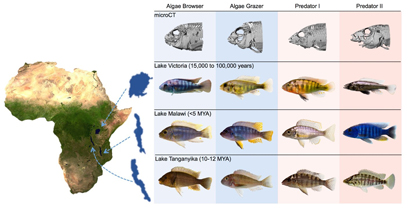Forschung

The transcriptional trajectory of jaw evolution in African cichlids
The decoupling of the oral and pharyngeal jaws is hypothesised to be a “key” innovation that facilitated the adaptive radiation of cichlid fishes in the Great African Lakes (Tanganyika, Malawi and Victoria). The plasticity in the jaws permitted cichlids to colonise new trophic niches by exploiting new and diverse food sources, thereby driving speciation. The transcriptional network underlying oral and pharyngeal jaw development in fish adapted to different trophic niches is not well understood. In this project we utilize RNAseq data from oral and pharyngeal jaws of cichlids to delineate the spatio-temporal regulatory networks of herbivorous and carnivorous cichlids.
Dissecting the genetic basis of alternative reproductive tactics in shell-brooding cichlids
An interesting case of alternative-reproductive tactics (ARTs) exists in the shell-brooding cichlid Lamprologous callipterus from Lake Tanganyika. Natural and sexual selection pressures permitted the evolution of dwarf males to compete with larger “bourgeois” males. Dwarf males employ sneaker tactics to enter the inner whorl of the shell that is inaccessible to bourgeois males and directly fertilise eggs laid by females. Ocana et al. (2014) found that the inheritance pattern of the dwarfism is typical of a single locus, Y-linked trait. In this project we are utilising whole-genome re-sequencing data to find the regions of the genome responsible for this dwarfism.
Phylogenomic analysis of Lake Tanganyika cichlids
The species-flocks of cichlids in Lake Tanganyika (LT) represent one of the most genetically, morphologically, and ecologically diverse groups of vertebrates. The high degree of endemism of species in this lake makes it a fascinating model for evolutionary studies. The ~200 species of cichlids from LT have been grouped into 12 – 16 lineages or tribes. The monophyletic relationships of the tribes are well established; however, the inter-tribal phylogenetic relationships remain contentious with numerous studies presenting conflicting results. This problem is compounded by hybridisation and incomplete lineage sorting for which cichlid adaptive radiations are well-known for. In this project we aim to resolve inter-tribal relationships of LT cichlids using hundreds of high-throughput sequencing markers.

PhD Pooja Singh


